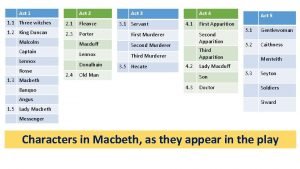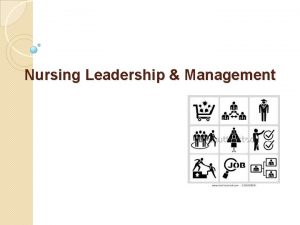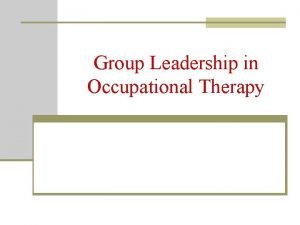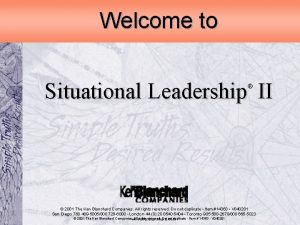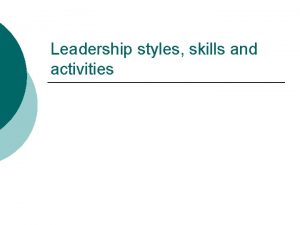Leadership styles Leadership management Leadership Management The act








- Slides: 8

Leadership styles

Leadership & management Leadership Management The act of establishing direction, Organising human and physical purpose and the necessary resources to achieve business aims capabilities among a group of people and objectives Leaders have certain qualities such as: • Vision • The ability to influence others Managers perform a range of functions such as: • Setting objectives • Co-ordinating activities • Reviewing performance According to Peter Drucker: ‘Management is doing things right; leadership is doing the right things. ’

Autocratic (authoritarian) Features of autocratic management: • The manager retains control and takes all the decisions • There is little consultation with workers • Subordinates are expected to obey instructions Benefits: Drawbacks: • Autocratic management allows quick decisions to be made • Often necessary during crisis situations • Can ensure that the direction of the organisation remains in line with organisational objectives • Workers may become dependent on the managers • Little creativity is encouraged • Employees may not be given the opportunity to express their ideas • May lead to workers feeling ignored or demotivated

Paternalistic Features of paternalistic management: • Similar to autocratic management but the leader makes decisions based on the best interests of the workers • Managers take most of the responsibility for decision making although there may be some consultation with workers Benefits: Drawbacks: • Employees feel valued • The workers may be persuaded that the decisions made are in their best interests • Little scope for employees to make decisions • There is still a ‘them and us’ culture with paternalistic management

Democratic Features of democratic management: • Employees are encouraged to participate in and influence decision making e. g. through suggestions schemes, quality circles and worker directors • Information is shared with team members • A single-status culture is encouraged Benefits: Drawbacks: • Democratic management can gain commitment, especially during periods of change • Employees are more likely to buy into decisions • Motivation may improve • Decision making can become slower

Laissez-faire Features of laissez-faire management: • Little direction is given to the workers • Broad guidelines may be provided but the day-to-day influence of managers is limited • Subordinates are free to make decisions Benefits: Drawbacks: • Useful for skilled, creative and well -trained employees • Can motivate workers as they have more control over their working lives • Decision-making can become very time-consuming and may lack direction • May lead to chaos if good teamwork, feedback and working relationships are not evident

Mc. Gregor’s Theory X & Y Managers According to Mc. Gregor, managers can be grouped depending on how they view their workers. He called the two types of manager: Theory X managers – these link closely to autocratic management Theory Y managers – these link closely to democratic management

Mc. Gregor’s Theory X & Y managers According to Mc. Gregor, Theory X managers think employees. . . According to Mc. Gregor, Theory Y managers think employees. . . • are lazy and are only motivated by pay • do not like work • need to be controlled and directed to do things they don’t enjoy • lack ambition • enjoy work • are motivated by a range of factors, not just money • can think for themselves and make decisions • relish responsibility • are ambitious
